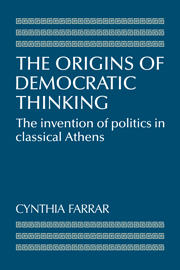Book contents
- Frontmatter
- Contents
- Dedication
- Preface
- 1 Ancient reflections: a force for us
- 2 Order in autonomy: the ungoverned cosmos and the democratic community
- 3 Protagoras: measuring man
- 4 Man's measurings: cosmos and community
- 5 Thucydides: reflecting history – man and the community
- 6 Democritus: reflecting man – the individual and the cosmos
- 7 Living democracy?
- Bibliography
- Indexes
6 - Democritus: reflecting man – the individual and the cosmos
Published online by Cambridge University Press: 23 October 2009
- Frontmatter
- Contents
- Dedication
- Preface
- 1 Ancient reflections: a force for us
- 2 Order in autonomy: the ungoverned cosmos and the democratic community
- 3 Protagoras: measuring man
- 4 Man's measurings: cosmos and community
- 5 Thucydides: reflecting history – man and the community
- 6 Democritus: reflecting man – the individual and the cosmos
- 7 Living democracy?
- Bibliography
- Indexes
Summary
While Thucydides argued that only as the citizen of a particular kind of social order could man come to understand the constraints on his ability to attain well-being and to act on that understanding, Democritus maintained that the way for the individual to secure his own good was to attend to his nature qua man. For Democritus, the order that shaped and expressed the exercise of human autonomy was not political, but cosmic. Man was part of nature. He must heed the stringent requirements of basic, physical well-being. Yet these requirements, though fundamental, were not, in the style of Antiphon, primitive. Atomism did not enjoin mere survival and the avoidance of physical harm, but a rich structure of behavioral and ethical norms tied, by a construal of human nature grounded in the nature of the cosmos, to intrinsic well-being. Because the normative constraints postulated by atomism, the view of the world as consisting of atoms and void, operated at the level of particles, they could serve as the foundation of order across the whole range of complex human behavior and interaction. The atomist did not need to appeal either to a crudely primitive or a socially determinate concept of man's nature and his good. That is, Democritus' account provides man with a way of understanding himself and his interests which is not defined in terms of those qualities associated with social status nor those required for and shaped by democratic political interaction.
- Type
- Chapter
- Information
- The Origins of Democratic ThinkingThe Invention of Politics in Classical Athens, pp. 192 - 264Publisher: Cambridge University PressPrint publication year: 1988

